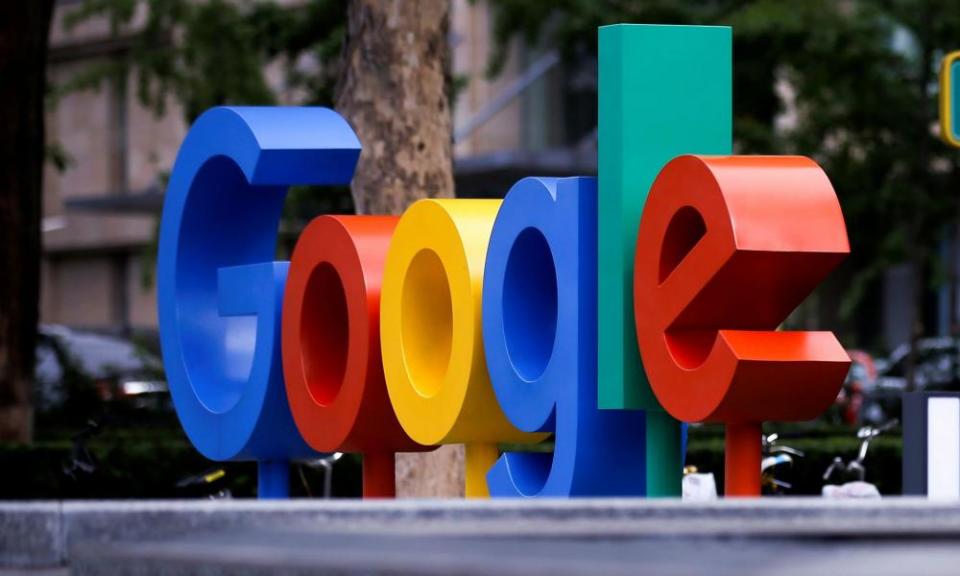Google’s dominance of Australia’s online advertising needs to be reined in, says ACCC

The Australian competition regulator has argued it needs more powers to control Google’s dominance of the $9.5bn Australian online advertising industry, with 90% of ad impressions passing through at least one Google service in 2020.
As part of its long-running digital platforms investigation, the Australian Competition and Consumer Commission launched an inquiry in March into the complex world of online ads and issues with the markets where those ads are bought and sold.
The displaying of ads on websites is most commonly determined through an automated auction system that uses information about who is visiting the site as well as the price of presenting the ad.
Related: ACCC boss calls for overhaul of merger and takeover laws with special rules for tech giants
The ACCC’s final report on the digital advertising market, released on Tuesday, found Google was involved in almost every part of the ad technology supply chain. In 2020, 90% of ad impressions traded via this supply chain passed through at least one Google-owned service, the report found.
“Google’s dominance is underpinned by multiple factors including its data advantage, access to exclusive inventory and advertiser demand, and integration across its services,” the report states.
“Over more than a decade, Google’s vertical integration and strength in ad tech services has allowed it to engage in a range of conduct which has lessened competition over time and entrenched its dominant position.”
Google’s takeover of ad companies, including DoubleClick and Admob, as well video platform YouTube, have helped to further solidify its position, the ACCC said.
The ACCC chair Rod Sims told Guardian Australia a key issue facing news sites and other users of ad tech is they did not know how much revenue ad tech providers like Google were making from each advertisement served up to readers. The ACCC estimates it to be around 27% of each advertisement sold.
Sims said there was no competitive tension in the market to keep rates lower, and it was also hard to get data on advertisers from Google.
“If you want to know which companies are advertising on your website, if you want to block certain companies advertising on your website, it’s very hard to do that through Google,” he said.
“Just that lack of choice of business models makes it a really tricky issue, and these are issues for many people who run websites, but particularly newspaper publishers – a very big issue in a big market that’s growing quickly.”
The ACCC made six recommendations in its report, including a requirement for Google to be more transparent in terms how it uses data collected from consumer services. It suggested a new industry code to improve transparency around fees for ad tech services. It also argued the ACCC should be given greater powers to enforce rules that limit the market power of any one player in the sector, and enforce more transparency.
Sims said the proposed rules would attempt to align with laws being developed in Europe and the UK.
“What we’ll be seeking to do here is trying to align with them as much as possible,” he said.
Related: Facebook reverses Australia news ban after government makes media code amendments
“Unlike the news media bargaining code where we went first, here [with ad tech] we’re not going first.
“We’re not going on the back of the pack, don’t get me wrong, but others are already out there doing it.”
Sims said the ACCC is also considering specific allegations about Google’s alleged behaviour under existing competition law.
Google responds
A spokesperson for Google argued the narrow focus of the inquiry – which excluded advertising on other digital platforms such as Twitter, Facebook and Snapchat – overlooked that Google also competed on advertising against those providers.
The spokesperson said a PwC report found three-quarters of Google’s ad tech customers in Australia were small and medium businesses, and that its services were estimated to support 15,000 full-time equivalent jobs, with an annual contribution of $2.45bn to the economy.
“As one of the many advertising technology providers in Australia, we will continue to work collaboratively with industry and regulators to support a healthy ads ecosystem.”
The framework for proposed new rules and powers will be part of a larger report the ACCC will release in September 2022, with consultations to commence in the first quarter of next year.

 Yahoo Finance
Yahoo Finance 